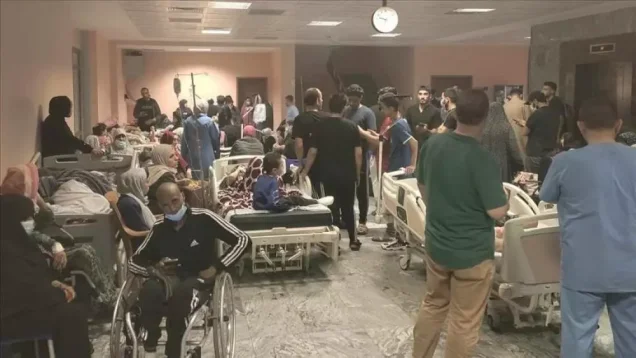
“My medication has run out, and I am very tired. I can hardly see in front of me, and my chemotherapy ended a long time ago.”
says 62-year-old Siham, who suffers from leukemia.
Cancer patients in Gaza are unable to access proper treatment due to the Israeli blockade. Palestinians also face challenges in traveling to obtain necessary treatment, as it requires lengthy and complicated permission from the occupying forces. This delay can worsen their health conditions, potentially leading to loss of life before they can receive treatment.
If a cancer patient has a 50% chance of survival, this percentage falls to a mere 1% if they are in the largest open-air prison, Gaza.
The number of cancer patients in Gaza is about 2,000, living in catastrophic health conditions as a result of the genocidal war waged by the Zionist occupation forces against Gaza.
According to statistics, at least 57 cancer patients died in the first three months of the Israeli aggression on Gaza without receiving any doses of the required medications.
Cancer treatment hospitals in Gaza:
The Turkish-Palestinian Friendship Hospital was the only hospital in the Gaza Strip designated for treating cancer patients. It consisted of three floors and included 180 beds, but this hospital was unable to operate due to running out of fuel initially, before the Zionist occupation forces bombed the hospital. However, it later resumed operations, albeit with a shortage of medicines. With the continued shortage of medicines, the hospital eventually went out of service.
Israel hasn't only bombed the sole cancer hospital in Gaza and cut off its fuel with impunity, but it also prevents cancer patients from traveling from Gaza to seek proper treatment.

In the attached photo: Youssef Yasser, a Palestinian journalist in Gaza, is one of the many cancer patients suffering from a lack of treatment.
Youssef is unable to receive treatment due to the ongoing genocide, and he has no choice but to endure his cruel illness.
Youssef has desperately tried everything to travel and receive treatment, hoping to survive cancer, but to no avail. Our indifferent world has refused to heed his pleas.
There are hundreds and hundreds of cancer patients in Gaza who are unable to obtain treatment and are prohibited from traveling to receive it.
Dying slowly:
Cancer patients stranded in the Gaza Strip endure extremely perilous conditions in the absence of treatment. Their only option is to relocate to hospitals in the West Bank and occupied Palestinian territories to receive appropriate care.
In addition to their illness-induced pain, they face the ongoing killing and destruction by the occupying forces, insecurity, the closure of crossings, and restrictions on movement to access necessary treatment. Furthermore, the overcrowding of hospitals and the prioritization of the most critically wounded often result in cancer patients being unable to secure the beds they desperately need.
Cancer patients in Gaza are slowly succumbing to their illness due to the severe shortage of medicines and treatment resulting from the Israeli siege on Gaza.
Israel, with impunity, has deprived Palestinians of their most fundamental human rights, including access to proper healthcare.
Targeting hospitals is a war crime
The Israeli occupation has targeted hospitals in the Gaza Strip as part of its aggression against the territory, besieging and bombing them, and endangering medical staff and civilians seeking refuge within. These actions are often justified by claims of the presence of military targets or command centers of “Hamas”, the Islamic Resistance Movement, beneath these hospitals.
Despite the occupation's failure to substantiate these claims, it persists in destroying the healthcare infrastructure in Gaza, met with silence from the international community and institutions. This raises questions about the provisions of international law regarding the targeting of hospitals during conflicts, the international agreements safeguarding medical facilities, and the potential penalties for those responsible for attacks on hospitals.

التعليقات - 4